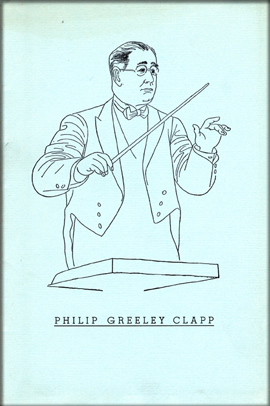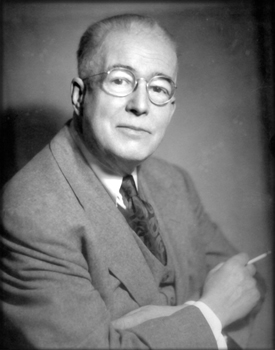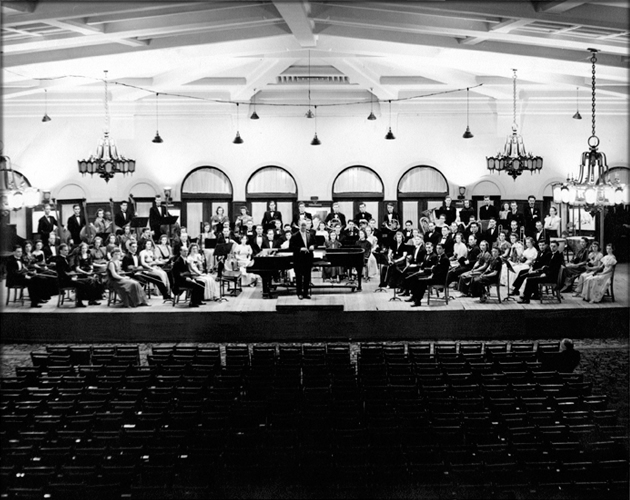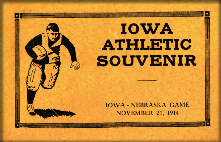-
Page Navigation Links:
- Skip to Site Navigation Links
- Skip to Features

- The University of Iowa
- Spectator
- Monthly News for UI Alumni and Friends

The legendary professor spent four decades integrating music into the lives of students and the community.
Old Gold’s mother, a 1950 alumna, possesses one of the finer things in life: a degree in English from The University of Iowa. Still, one of her most fondly remembered professors is a man who loomed large in the School of Music for nearly four decades: Philip Greeley Clapp (1888–1954).
“I was in his music appreciation class in the fall of 1949,” she recalls. “There were 20 or so of us and we met on Friday afternoons. You didn’t have to be a music major to take the course. We learned about musical structure and how a performer might interpret something.” The course was broadcast on WSUI radio, so Clapp’s lectures—accompanied by demonstrations on the piano—went far beyond the two dozen students in his classroom.
Clapp’s name and the word legendary belong together. The Boston native and Harvard alumnus arrived in Iowa City in 1919 as professor and head of what was then the department of music. Charles Calmer (MA ’81, MFA ’85, PhD ’92), Clapp’s biographer, wrote in 1983 that Clapp “ruled the department with an iron will tempered by brilliance, [and] aimed to fully integrate music into the Liberal Arts curriculum.” His music appreciation courses were a popular example.
In 1936, Clapp, in addition to his duties as head of the music school, succeeded Frank Kendrie as the University’s orchestra director. Within two years Clapp implemented a performance calendar of six concerts each year, a demanding schedule that brought national recognition. Olin Downes, a New York Times music critic, described the orchestra in 1941 as “the best [college orchestra] we have heard thus far anywhere in the country.” Clapp received numerous awards, including the Bruckner Medal in 1940 and the Mahler Medal in 1942. More than 60 of his musical scores are represented in his papers in the University Archives.
E.C. Mabie, head of the University’s theatre department during much of Clapp’s tenure, was said to have a difficult, competitive relationship with his music school counterpart. It’s open to debate how the two actually got along, but as Andrew Brownstein noted in the winter 1996 issue of Iowa Alumni Quarterly, the two had genuine admiration for one another, even if they jealously—and warily—guarded their respective kingdoms.
Clapp died on April 9, 1954, when he collapsed from a podium during a rehearsal, the victim of a heart attack. According to biographer Calmer, his final words were, “Take a long time to tune.”
—David McCartney, University Archivist
 Concert program cover, 1944. Drawing by Philip Guston. From Faculty and Staff Vertical Files (RG 01.15.03), Philip Greeley Clapp folder, University Archives, Dept. of Special Collections, University of Iowa Libraries
Concert program cover, 1944. Drawing by Philip Guston. From Faculty and Staff Vertical Files (RG 01.15.03), Philip Greeley Clapp folder, University Archives, Dept. of Special Collections, University of Iowa Libraries

Portrait of Clapp: From F.W. Kent Collection of Photographs (RG 30.01.01), Faculty and Staff series, University Archives, Dept. of Special Collections, University of Iowa Libraries

The conductor and University of Iowa Orchestra, 1938–39 season: From F.W. Kent Collection of Photographs (RG 30.01), Colleges and Departments series, Music Organizations folder, University Archives, Dept. of Special Collections, University of Iowa Libraries
NEXT MONTH:
Iowa versus Nebraska? It’s déjà vu all over again.

Source—Gift of Carolyn Boerner, from Accession 2010-61, University Archives, Dept. of Special Collections, University of Iowa Libraries
If you’ve got memories to share, please send them to Spectator@IOWA and we’ll run some next month.
Previous Old Gold editions:
© The University of Iowa 2009